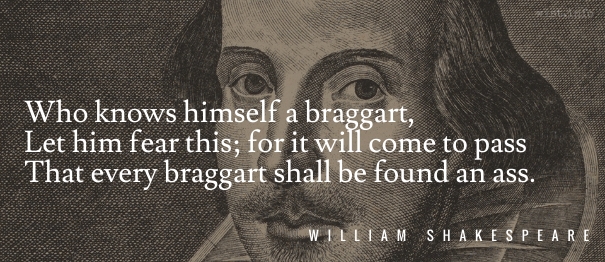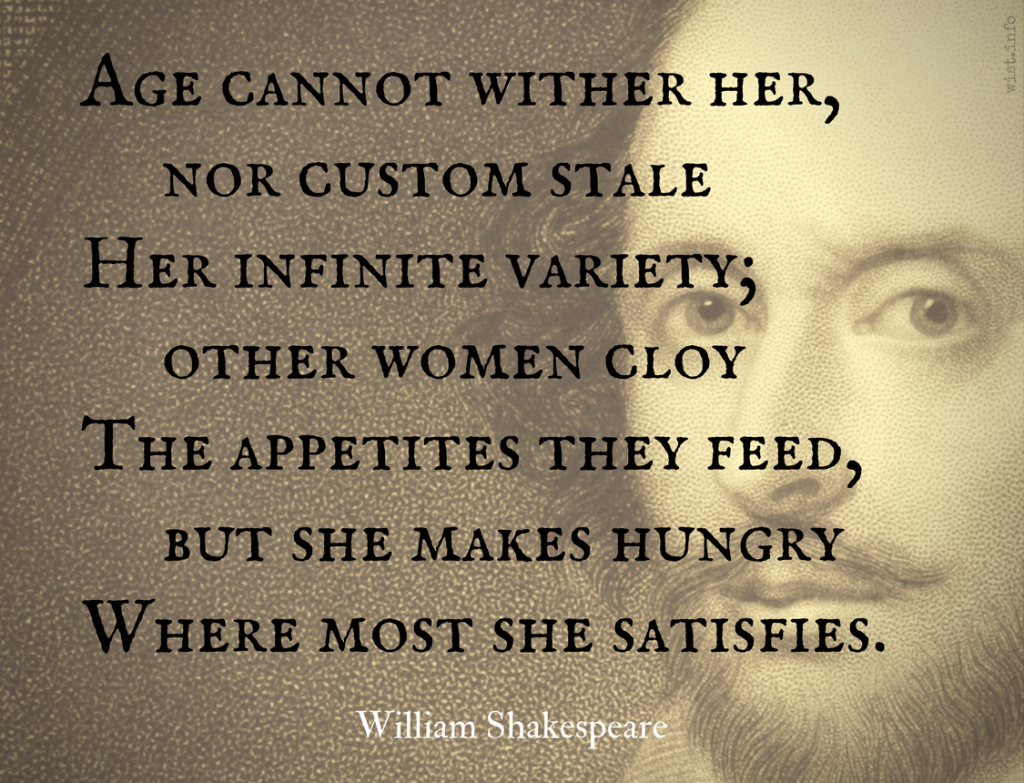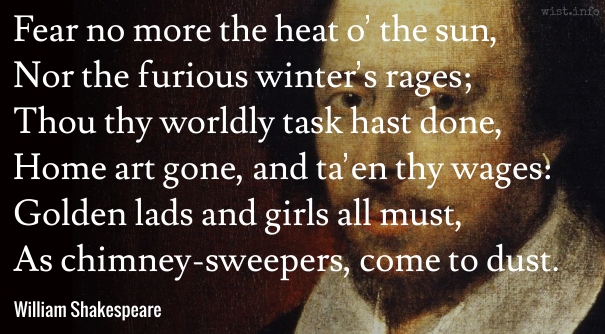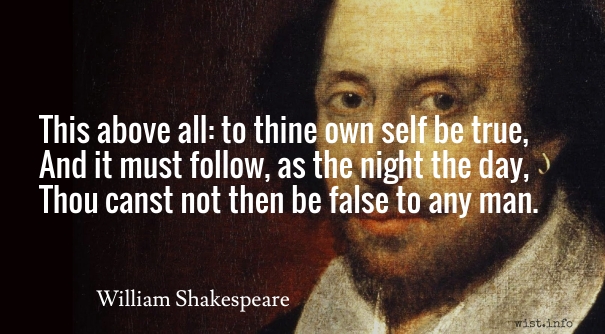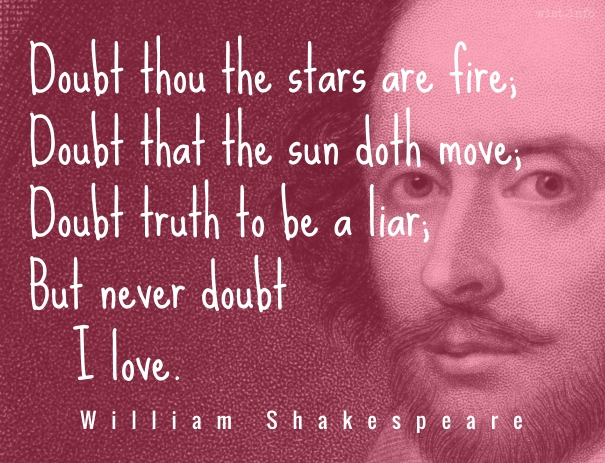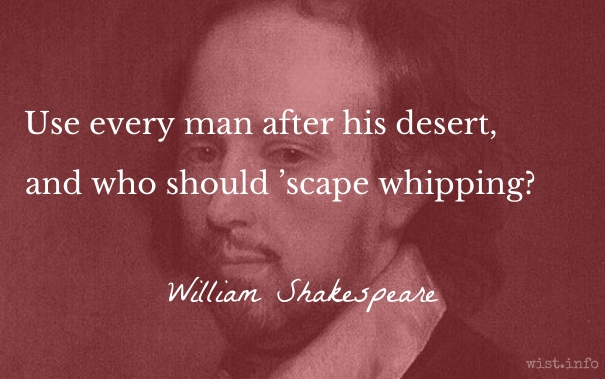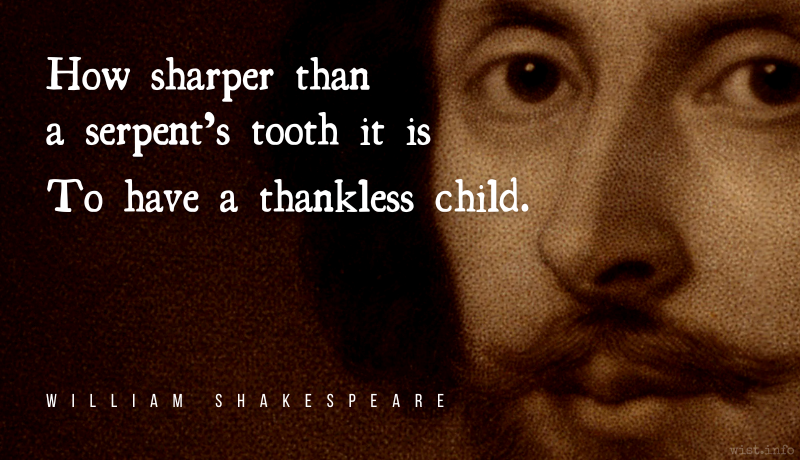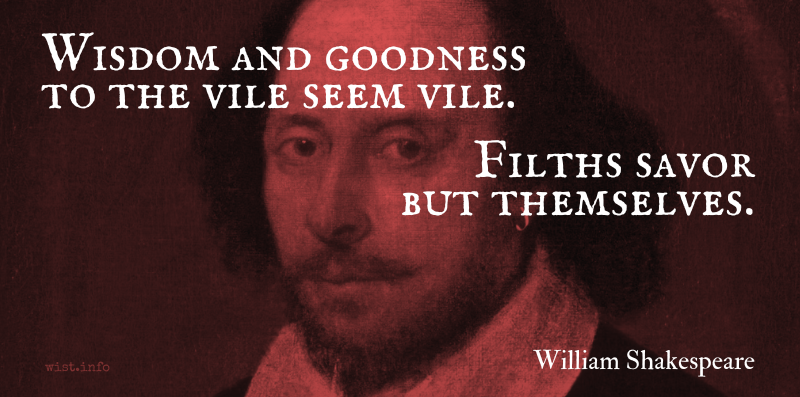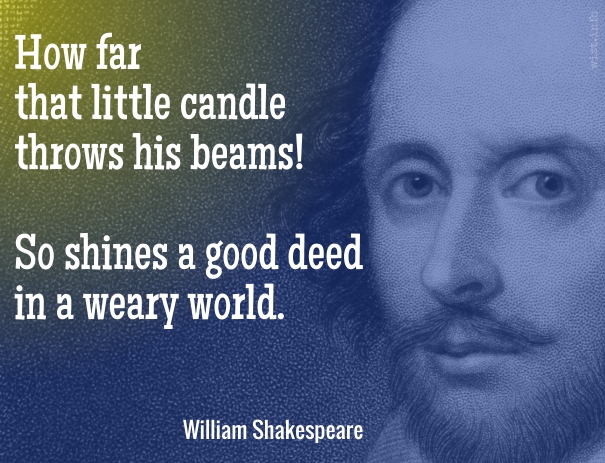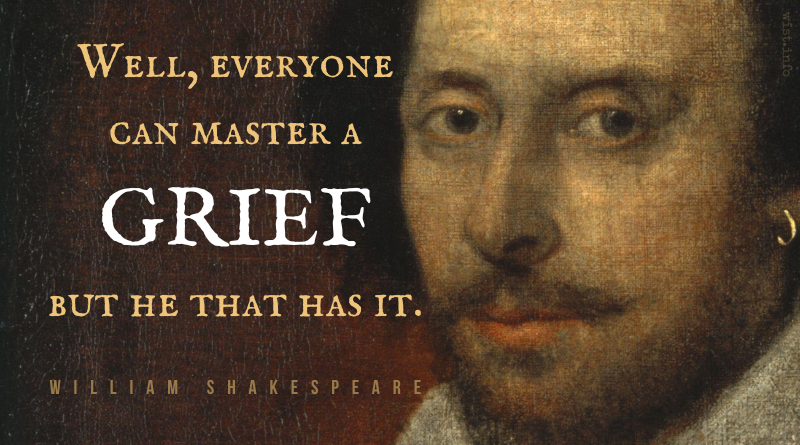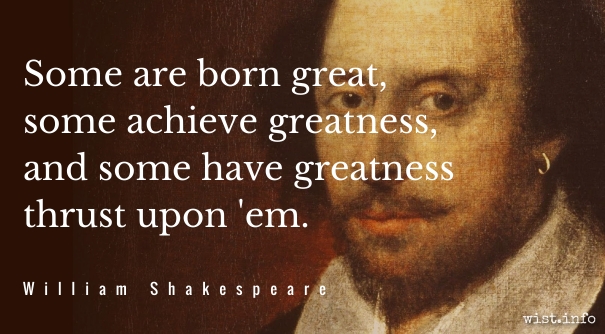Fellowship in woe doth woe assuage.
Quotations by:
Shakespeare, William
LAFEW: Moderate lamentation is the right of the dead,
excessive grief the enemy to the living.William Shakespeare (1564-1616) English dramatist and poet
All’s Well That Ends Well, Act 1, sc. 1, l. 57ff (1.1.57-58) (1602?)
(Source)
COUNTESS: Love all, trust a few,
Do wrong to none.William Shakespeare (1564-1616) English dramatist and poet
All’s Well That Ends Well, Act 1, sc. 1, l. 66ff (1.1.66-67)(1602?)
(Source)
HELENA: There is no living, none,
If Bertram be away. ’Twere all one
That I should love a bright particular star
And think to wed it, he is so above me.
In his bright radiance and collateral light
Must I be comforted, not in his sphere.
Th’ ambition in my love thus plagues itself:
The hind that would be mated by the lion
Must die for love.William Shakespeare (1564-1616) English dramatist and poet
All’s Well That Ends Well, Act 1, sc. 1, l. 89ff (1.1.89-97) (1602?)
(Source)
HELENA: Our remedies oft in ourselves do lie,
Which we ascribe to Heaven.William Shakespeare (1564-1616) English dramatist and poet
All’s Well That Ends Well, Act 1, sc. 1, l. 222ff (1.1.222-223) (1602?)
(Source)
COUNTESS: Tell me thy reason why thou wilt marry.
FOOL: My poor body, madam, requires it. I am driven on by the flesh, and he must needs go that the devil drives.
William Shakespeare (1564-1616) English dramatist and poet
All’s Well That Ends Well, Act 1, sc. 3, l. 28ff (1.3.28-31) (1602?)
(Source)
HELENA: Oft expectation fails and most oft there
Where most it promises, and oft it hits
Where hope is coldest and despair most fits.William Shakespeare (1564-1616) English dramatist and poet
All’s Well That Ends Well, Act 2, sc. 1, l. 160ff (2.1.160-162) (1602?)
(Source)
COUNTESS: It is the show and seal of nature’s truth,
Where love’s strong passion is impress’d in youth:
By our remembrances of days foregone,
Such were our faults; — or then we thought them none.William Shakespeare (1564-1616) English dramatist and poet
All’s Well That Ends Well, Act 2, sc. 3, l. 134ff (2.3.134-137) (1602?)
(Source)
KING: From lowest place when virtuous things proceed,
The place is dignified by the doer’s deed.William Shakespeare (1564-1616) English dramatist and poet
All’s Well That Ends Well, Act 2, sc. 3, l. 136ff (2.3.136-137) (1602?)
(Source)
MARIANA: No legacy is so rich as honesty.
William Shakespeare (1564-1616) English dramatist and poet
All’s Well that Ends Well, Act 3, sc. 5, l. 13 (3.5.13) (1602?)
(Source)
FIRST LORD: The web of our life is a mingled yarn,
good and ill together.William Shakespeare (1564-1616) English dramatist and poet
All’s Well That Ends Well, Act 4, sc. 3, l. 73ff (4.3.73-74) (1602?)
(Source)
PAROLLES: Who knows himself a braggart,
Let him fear this; for it will come to pass
That every braggart shall be found an ass.William Shakespeare (1564-1616) English dramatist and poet
All’s Well That Ends Well, Act 4, sc. 3, l. 356ff (4.3.356-358) (1602?)
(Source)
HELENA: All’s well that ends well. Still the fine’s the crown.
Whate’er the course, the end is the renown.William Shakespeare (1564-1616) English dramatist and poet
All’s Well That Ends Well, Act 4, sc. 4, l. 39ff (4.4.39-40) (1602?)
(Source)
KING OF FRANCE: For we are old, and on our quick’st decrees
Th’ inaudible and noiseless foot of time
Steals ere we can effect them.William Shakespeare (1564-1616) English dramatist and poet
All’s Well That Ends Well, Act 5, sc. 3, l. 48ff (5.3.48-50) (1602?)
(Source)
BERTRAM: If she, my liege, can make me know this clearly,
I’ll love her dearly, ever, ever dearly.William Shakespeare (1564-1616) English dramatist and poet
All’s Well That Ends Well, Act 5, sc. 3, l. 360ff (5.3.360-361) (1602?)
(Source)
KING: All yet seems well, and if it end so meet,
The bitter past, more welcome is the sweet.William Shakespeare (1564-1616) English dramatist and poet
All’s Well That Ends Well, Act 5, sc. 3, l. 378ff (5.3.378-379) (1602?)
(Source)
MENAS: We, ignorant of ourselves,
Beg often our own harms, which the wise powers
Deny us for our good; so find we profit
By losing of our prayers.William Shakespeare (1564-1616) English dramatist and poet
Antony and Cleopatra, Act 2, sc. 1, l. 7ff (2.1.7-10) (1607)
(Source)
ENOBARBUS: Age cannot wither her, nor custom stale
Her infinite variety; other women cloy
The appetites they feed, but she makes hungry
Where most she satisfies.William Shakespeare (1564-1616) English dramatist and poet
Antony and Cleopatra, Act 2, sc. 2, l. 276ff (2.2.276-279) (1607)
(Source)
ENOBARBUS: When valor preys on reason,
It eats the sword it fights with.William Shakespeare (1564-1616) English dramatist and poet
Antony and Cleopatra, Act 3, sc. 13, ll. 240ff (3.13.240-241) (1607)
(Source)
ANTONY: To business that we love we rise betime
And go to ’t with delight.William Shakespeare (1564-1616) English dramatist and poet
Antony and Cleopatra, Act 4, sc. 4, l. 27ff (4.4.27-28) (1607)
(Source)
ROSALIND:O,
how full of briers is this working-day world!William Shakespeare (1564-1616) English dramatist and poet
As You Like It, Act 1, sc. 3, l. 11ff (1.3.11-12) (1599)
(Source)
DUKE SENIOR: Sweet are the uses of adversity,
Which, like the toad, ugly and venomous,
Wears yet a precious jewel in his head.William Shakespeare (1564-1616) English dramatist and poet
As You Like It, Act 2, sc. 1, l. 12ff (2.1.12-14) (1599)
(Source)
TOUCHSTONE: We that are true lovers run into strange capers.
William Shakespeare (1564-1616) English dramatist and poet
As You Like It, Act 2, sc. 4, l. 53ff (2.4.53) (1599)
(Source)
ORLANDO:The thorny point
Of bare distress hath ta’en from me the show
Of smooth civility.William Shakespeare (1564-1616) English dramatist and poet
As You Like It, Act 2, sc. 7, l. 99ff (2.7.99-101) (1599)
(Source)
DUKE SENIOR: Thou seest we are not all alone unhappy.
This wide and universal theater
Presents more woeful pageants than the scene
Wherein we play in.William Shakespeare (1564-1616) English dramatist and poet
As You Like It, Act 2, sc. 7, l. 142ff (2.7.142-145) (1599)
(Source)
JAQUES:All the world’s a stage,
And all the men and women merely players.
They have their exits and their entrances,
And one man in his time plays many parts ….William Shakespeare (1564-1616) English dramatist and poet
As You Like It, Act 2, sc. 7, l. 146ff (2.7.146-149) (1599)
(Source)
JAQUES: [O]ne man in his time plays many parts,
His acts being seven ages. At first the infant,
Mewling and puking in the nurse’s arms.
Then the whining schoolboy with his satchel
And shining morning face, creeping like snail
Unwillingly to school. And then the lover,
Sighing like furnace, with a woeful ballad
Made to his mistress’ eyebrow. Then a soldier,
Full of strange oaths and bearded like the pard,
Jealous in honor, sudden and quick in quarrel,
Seeking the bubble reputation
Even in the cannon’s mouth. And then the justice,
In fair round belly with good capon lined,
With eyes severe and beard of formal cut,
Full of wise saws and modern instances;
And so he plays his part. The sixth age shifts
Into the lean and slippered pantaloon
With spectacles on nose and pouch on side,
His youthful hose, well saved, a world too wide
For his shrunk shank, and his big manly voice,
Turning again toward childish treble, pipes
And whistles in his sound. Last scene of all,
That ends this strange eventful history,
Is second childishness and mere oblivion,
Sans teeth, sans eyes, sans taste, sans everything.William Shakespeare (1564-1616) English dramatist and poet
As You Like It, Act 2, sc. 7, l. 149ff (2.7.149-173) (1599)
(Source)
OLIVER: Kindness, nobler ever than revenge.
William Shakespeare (1564-1616) English dramatist and poet
As You Like It, Act 4, sc. 3, l. 135 (4.3.135) (1599)
(Source)
TOUCHSTONE: I do now remember a saying, “The fool doth think he is wise, but the wise man knows himself to be a fool.”
William Shakespeare (1564-1616) English dramatist and poet
As You Like It, Act 5, sc. 1, l. 30ff (5.1.30-32) (1599)
(Source)
ORLANDO: But, O, how bitter a thing it is to look into happiness through another man’s eyes!
William Shakespeare (1564-1616) English dramatist and poet
As You Like It, Act 5, sc. 2, l. 45ff (5.2.45) (1599)
(Source)
VOLUMNIA: Hear me profess sincerely: had I a dozen sons, each in my love alike and none less dear than thine and my good Martius, I had rather had eleven die nobly for their country than one voluptuously surfeit out of action.
William Shakespeare (1564-1616) English dramatist and poet
Coriolanus, Act 1, sc. 3, l. 21ff. (1.3.21) (c. 1608)
(Source)
"Voluptuously surfeit out of action" = to die indulgent, idle, and lazy
FIRST OFFICER: That’s a brave fellow, but he’s vengeance proud and loves not the common people.
SECOND OFFICER: ’Faith, there hath been many great men that have flattered the people who ne’er loved them; and there be many that they have loved they know not wherefore; so that, if they love they know not why, they hate upon no better a ground. Therefore, for Coriolanus neither to care whether they love or hate him manifests the true knowledge he has in their disposition and, out of his noble carelessness, lets them plainly see ’t.
William Shakespeare (1564-1616) English dramatist and poet
Coriolanus, Act 2, sc. 2, l. 5ff (2.2.5-15) (c. 1608)
(Source)
THIRD CITIZEN: Ingratitude is monstrous.
William Shakespeare (1564-1616) English dramatist and poet
Coriolanus, Act 2, sc. 3, l. 10 (2.3.10) (c. 1608)
(Source)
VOLUMNIA: Anger’s my meat; I sup upon myself,
And so shall starve with feeding.William Shakespeare (1564-1616) English dramatist and poet
Coriolanus, Act 2, sc. 4, l. 68ff (2.4.68-69) (c. 1608)
(Source)
MENENIUS: His nature is too noble for the world.
He would not flatter Neptune for his trident
Or Jove for ‘s power to thunder. His heart’s his mouth;
What his breast forges, that his tongue must vent,
And, being angry, does forget that ever
He heard the name of death.William Shakespeare (1564-1616) English dramatist and poet
Coriolanus, Act 3, sc. 1, l. 326ff (3.1.326-331) (c. 1608)
(Source)
Speaking of the title character.
VOLUMNIA: You might have been enough the man you are
With striving less to be so.William Shakespeare (1564-1616) English dramatist and poet
Coriolanus, Act 3, sc. 2, l. 23ff (3.2.23-24) (c. 1607)
(Source)
VOLUMNIA: Action is eloquence.
William Shakespeare (1564-1616) English dramatist and poet
Coriolanus, Act 3, sc. 2, l. 95 (3.2.95) (c. 1608)
(Source)
FIRST SERVINGMAN: Let me have war, say I. It exceeds peace as far as day does night. It’s sprightly walking, audible, and full of vent. Peace is a very apoplexy, lethargy; mulled, deaf, sleepy, insensible; a getter of more bastard children than war’s a destroyer of men.
William Shakespeare (1564-1616) English dramatist and poet
Coriolanus, Act 4, sc. 5, l. 244ff (4.5.244-249) (c. 1608)
(Source)
CORIOLANUS:I’ll never
Be such a gosling to obey instinct; but stand,
As if a man were author of himself,
And knew no other kin.William Shakespeare (1564-1616) English dramatist and poet
Coriolanus, Act 5, sc. 3, l. 38ff (5.3.38-41) (c. 1608)
(Source)
IMOGEN:O,
Dissembling courtesy! How fine this tyrant
Can tickle where she wounds!William Shakespeare (1564-1616) English dramatist and poet
Cymbeline, Act 1, sc. 1, l. 97ff (1.1.97-99) (1611)
(Source)
GUIDERIUS: Fear no more the heat o’ the sun,
Nor the furious winter’s rages;
Thou thy worldly task hast done,
Home art gone, and ta’en thy wages:
Golden lads and girls all must,
As chimney-sweepers, come to dust.
William Shakespeare (1564-1616) English dramatist and poet
Cymbeline, Act 3, sc. 2, l. 331ff (3.2.331-336) (1611)
(Source)
IMOGEN: Society is not comfort
To one not sociable.William Shakespeare (1564-1616) English dramatist and poet
Cymbeline, Act 4, sc. 2, l. 14ff (4.2.14-15) (1611)
(Source)
PISANIO: Fortune brings in some boats that are not steered.
William Shakespeare (1564-1616) English dramatist and poet
Cymbeline, Act 4, sc. 3, l. 54 (4.3.54) (1611)
(Source)
HORATIO: Season your admiration for a while
With an attent ear, till I may deliver
Upon the witness of these gentlemen
This marvel to you.William Shakespeare (1564-1616) English dramatist and poet
Hamlet, Act 1, sc. 1, l. 201ff (1.1.201-204) (c. 1600)
(Source)
OPHELIA:But, good my brother,
Do not, as some ungracious pastors do,
Show me the steep and thorny way to heaven,
Whiles, like a puffed and reckless libertine,
Himself the primrose path of dalliance treads
And recks not his own rede.William Shakespeare (1564-1616) English dramatist and poet
Hamlet, Act 1, sc. 3, l. 50ff (1.3.50-55) (c. 1600)
(Source)
POLONIUS: Those friends thou hast, and their adoption tried,
Grapple them to thy soul with hoops of steel.William Shakespeare (1564-1616) English dramatist and poet
Hamlet, Act 1, sc. 3, l. 68ff [Polonius] (c. 1600)
(Source)
POLONIUS: This above all: to thine own self be true,
And it must follow, as the night the day,
Thou canst not then be false to any man.William Shakespeare (1564-1616) English dramatist and poet
Hamlet, Act 1, sc. 3, l. 84ff (1.3.84-86) (c. 1600)
(Source)
HAMLET: O villain, villain, smiling, damnèd villain!
My tables — meet it is I set it down
That one may smile and smile and be a villain.William Shakespeare (1564-1616) English dramatist and poet
Hamlet, Act 1, sc. 5, l. 113ff (1.5.113-115) (c. 1600)
(Source)
HAMLET: There are more things in heaven and earth, Horatio,
Than are dreamt of in your philosophy.William Shakespeare (1564-1616) English dramatist and poet
Hamlet, Act 1, sc. 5, l. 187ff (1.5.187-188) (c. 1600)
(Source)
POLONIUS: Brevity is the soul of wit.
William Shakespeare (1564-1616) English dramatist and poet
Hamlet, Act 2, sc. 2, l. 97 (2.2.97) (c. 1600)
(Source)
In full, from the least brief-speaking character in the play:
Therefore, since brevity is the soul of wit,
And tediousness the limbs and outward flourishes,
I will be brief ...."
HAMLET: Doubt thou the stars are fire;
Doubt that the sun doth move;
Doubt truth to be a liar;
But never doubt I love.
William Shakespeare (1564-1616) English dramatist and poet
Hamlet, Act 2, sc. 2, l. 124ff (2.2.124-127) (c. 1600)
(Source)
A letter from Hamlet to Ophelia, read by Polonius.
POLONIUS: Though this be madness, yet there is method in’t.
William Shakespeare (1564-1616) English dramatist and poet
Hamlet, Act 2, sc. 2, l. 223 (2.2.223) (c. 1600)
(Source)
HAMLET: For there is nothing either good or bad, but thinking makes it so.
William Shakespeare (1564-1616) English dramatist and poet
Hamlet, Act 2, sc. 2, l. 268ff (2.2.268) (c. 1600)
(Source)
ROSENCRANTZ: Many wearing rapiers are afraid of goosequills.
William Shakespeare (1564-1616) English dramatist and poet
Hamlet, Act 2, sc. 2, l. 366ff (2.2.366) (c. 1600)
(Source)
HAMLET: Use every man after his desert, and who should ‘scape whipping?
William Shakespeare (1564-1616) English dramatist and poet
Hamlet, Act 2, sc. 2, l. 555ff (2.2.555) (c. 1600)
(Source)
HAMLET:Who would fardels bear,
To grunt and sweat under a weary life,
But that the dread of something after death,
The undiscovered country from whose bourn
No traveler returns, puzzles the will
And makes us rather bear those ills we have
Than fly to others that we know not of?William Shakespeare (1564-1616) English dramatist and poet
Hamlet, Act 3, sc. 1, l. 84ff (3.1.84-90) (c. 1600)
(Source)
"Fardels" = "burdens"
HAMLET: Thus conscience does make cowards of us all,
And thus the native hue of resolution
Is sicklied o’er with the pale cast of thought,
And enterprises of great pitch and moment
With this regard their currents turn awry
And lose the name of action.William Shakespeare (1564-1616) English dramatist and poet
Hamlet, Act 3, sc. 1, l. 91ff (3.1.91-96) (c. 1600)
(Source)
"Conscience" in this case is used in its archaic form, as consciousness, awareness.
HAMLET: Be thou as chaste as ice, as pure as snow, thou shalt not escape calumny.
William Shakespeare (1564-1616) English dramatist and poet
Hamlet, Act 3, sc. 1, l. 147ff (3.1.147-148) (c. 1600)
(Source)
OPHELIA: Lord, we know what we are but know not what we may be.
William Shakespeare (1564-1616) English dramatist and poet
Hamlet, Act 4, sc. 5, l. 48ff (4.5.48-49) (c. 1600)
(Source)
CLAUDIUS: When sorrows come, they come not single spies,
But in battalions.William Shakespeare (1564-1616) English dramatist and poet
Hamlet, Act 4, sc. 5, l. 84ff (4.5.84-85) (c. 1600)
(Source)
HAMLET: There’s a divinity that shapes our ends,
Rough-hew them how we will —William Shakespeare (1564-1616) English dramatist and poet
Hamlet, Act 5, sc. 2, l. 11ff (5.2.11-12) (c. 1600)
(Source)
HAMLET: If it be now, ’tis not to come; if it be not to come, it will be now; if it be not now, yet it will come. The readiness is all.
William Shakespeare (1564-1616) English dramatist and poet
Hamlet, Act 5, sc. 2, l. 234ff (5.2.234) (c. 1600)
(Source)
HAL: Wisdom cries out in the streets, and no man regards it.
William Shakespeare (1564-1616) English dramatist and poet
Henry IV, Part 1, Act 1, sc. 2, l. 94ff (1.2.94) (1597)
(Source)
HAL: If all the year were playing holidays,
To sport would be as tedious as to work,
But when they seldom come, they wished-for come,
And nothing pleaseth but rare accidents.William Shakespeare (1564-1616) English dramatist and poet
Henry IV, Part 1, Act 1, sc. 2, l. 211ff (1.2.211-212) (1597)
(Source)
GLENDOWER: I can call spirits from the vasty deep.
HOTSPUR: Why, so can I, or so can any man;
But will they come when you do call for them?William Shakespeare (1564-1616) English dramatist and poet
Henry IV, Part 1, Act 3, sc. 1, l. 55ff (3.1.55-57) (1597)
(Source)
FALSTAFF: The better part of valour is discretion.
William Shakespeare (1564-1616) English dramatist and poet
Henry IV, Part 1, Act 4, sc. 4, l. 122ff (4.4.122) (1597)
(Source)
WORCESTER: For mine own part I could be well content
To entertain the lag end of my life
With quiet hours.William Shakespeare (1564-1616) English dramatist and poet
Henry IV, Part 1, Act 5, sc. 1, l. 24 (5.1.24-26) (1597)
(Source)
HENRY: God befriend us as our cause is just.
William Shakespeare (1564-1616) English dramatist and poet
Henry IV, Part 1, Act 5, sc. 1, l. 121 (5.1.121) (1597)
(Source)
FALSTAFF: Lord, Lord, how this world is given to lying!
William Shakespeare (1564-1616) English dramatist and poet
Henry IV, Part 1, Act 5, sc. 4, l. 148 (5.4.148) (1597)
(Source)
ARCHBISHOP:O thoughts of men accursed!
Past and to come seems best; things present, worst.William Shakespeare (1564-1616) English dramatist and poet
Henry IV, Part 2, Act 1, sc. 3, l. 112ff (1.3.112-113) (c. 1598)
(Source)
HENRY: Canst thou, O partial sleep, give thy repose
To the wet sea-boy in an hour so rude,
And, in the calmest and most stillest night,
With all appliances and means to boot,
Deny it to a king? Then, happy low, lie down.
Uneasy lies the head that wears a crown.William Shakespeare (1564-1616) English dramatist and poet
Henry IV, Part 2, Act 3, sc. 1, l. 26ff (3.1.26-31) (c. 1598)
(Source)
HENRY: Are these things then necessities?
Then let us meet them like necessities.William Shakespeare (1564-1616) English dramatist and poet
Henry IV, Part 2, Act 3, sc. 1, l. 94ff (3.1.94-95) (c. 1598)
(Source)
HAL: Presume not that I am the thing I was;
For God doth know — so shall the world perceive —
That I have turn’d away my former self.William Shakespeare (1564-1616) English dramatist and poet
Henry IV, Part 2, Act 5, sc. 5, l. 60ff (5.5.60-62) (c. 1598)
(Source)
CHORUS: O! for a muse of fire, that would ascend
The brightest heaven of invention!
A kingdom for a stage, princes to act,
And monarchs to behold the swelling scene!
BISHOP OF ELY: The strawberry grows underneath the nettle.
William Shakespeare (1564-1616) English dramatist and poet
Henry V, Act 1, sc. 1, l. 63 (1.1.63) (1599)
(Source)
DAUPHIN: Self-love, my liege, is not so vile a sin
As self-neglecting.William Shakespeare (1564-1616) English dramatist and poet
Henry V, Act 2, sc. 4, l. 80ff (2.4.80-81) (1599)
(Source)
HENRY: Once more unto the breach, dear friends, once more;
Or close the wall up with our English dead!
In peace, there’s nothing so becomes a man,
As modest stillness and humility:
But when the blast of war blows in our ears,
Then imitate the action of the tiger;
Stiffen the sinews, summon up the blood,
Disguise fair nature with hard-favored rage ….William Shakespeare (1564-1616) English dramatist and poet
Henry V, Act 3, sc. 1, l. 1ff (3.1.1-8) (1599)
(Source)
HENRY: I see you stand like greyhounds in the slips,
Straining upon the start. The game’s afoot;
Follow your spirit: and upon this charge,
Cry “God for Harry, England, and Saint George!”William Shakespeare (1564-1616) English dramatist and poet
Henry V, Act 3, sc. 1, l. 34ff (3.1.34-37) (1599)
(Source)
PISTOL: Knocks go and come. God’s vassals drop and die,
And sword and shield,
In bloody field,
Doth win immortal fame.BOY: Would I were in an alehouse in London! I would
give all my fame for a pot of ale, and safety.PISTOL: And I.
William Shakespeare (1564-1616) English dramatist and poet
Henry V, Act 3, sc. 2, l. 9ff (3.2.9-14) (1599)
(Source)
HENRY: God almighty,
There is some soul of goodness in things evil,
Would men observingly distill it out.
For our bad neighbor makes us early stirrers,
Which is both healthful and good husbandry.
Besides, they are our outward consciences
And preachers to us all, admonishing
That we should dress us fairly for our end.
Thus may we gather honey from the weed
And make a moral of the devil himself.
FLUELLEN: If the enemy is an ass and a fool and a prating coxcomb, is it meet, think you, that we should also, look you, be an ass and a fool and a prating coxcomb, in your own conscience now?
William Shakespeare (1564-1616) English dramatist and poet
Henry V, Act 4, sc. 1, l. 80ff (4.1.80-83) (1599)
(Source)
HENRY: Every subject’s duty is the king’s; but every subject’s soul is his own.
William Shakespeare (1564-1616) English dramatist and poet
Henry V, Act 4, sc. 1, l. 182ff (4.1.182-183) (1599)
(Source)
Eschewing responsibility for his soldiers dying with unconfessed sins.
HENRY: Rather proclaim it, Westmoreland, through my host,
That he which hath no stomach to this fight,
Let him depart; his passport shall be made,
And crowns for convoy put into his purse:
We would not die in that man’s company,
That fears his fellowship to die with us.William Shakespeare (1564-1616) English dramatist and poet
Henry V, Act 4, sc. 3, l. 37ff (4.3.37-42) (1599)
(Source)
HENRY: This story shall the good man teach his son;
And Crispin Crispian shall ne’er go by
From this day to the ending of the world,
But we in it shall be remember’d, —
We few, we happy few, we band of brothers.
For he to-day that sheds his blood with me,
Shall be my brother; be he ne’er so vile,
This day shall gentle his condition:
And gentlemen in England, now a-bed,
Shall think themselves accurs’d, they were not here,
And hold their manhoods cheap, whiles any speaks,
That fought with us upon Saint Crispin’s day.William Shakespeare (1564-1616) English dramatist and poet
Henry V, Act 4, sc. 3, l. 58ff (4.3.58-69) (1599)
(Source)
FLUELLEN: There is occasions and causes why and wherefore in all things.
William Shakespeare (1564-1616) English dramatist and poet
Henry V, Act 5, sc. 1, l. 3ff (5.1.3) (1599)
(Source)
HENRY: A speaker is but a prater, a rhyme is but a ballad, a good leg will fall, a straight back will stoop, a black beard will turn white, a curled pate will grow bald, a fair face will wither, a full eye will wax hollow, but a good heart, Kate, is the sun and the moon, or rather the sun and not the moon, for it shines bright and never changes but keeps his course truly. If thou would have such a one, take me.
MARGARET: Now ’tis the spring, and weeds are shallow-rooted;
Suffer them now, and they’ll o’ergrow the garden
And choke the herbs for want of husbandry.William Shakespeare (1564-1616) English dramatist and poet
Henry VI, Part 2, Act 3, sc. 1, l. 31ff (3.1.31-33) (1591)
(Source)
HENRY: What stronger breastplate than a heart untainted?
Thrice is he armed that hath his quarrel just,
And he but naked, though locked up in steel,
Whose conscience with injustice is corrupted.
WARWICK: So bad a death argues a monstrous life.
HENRY: Forbear to judge, for we are sinners all.William Shakespeare (1564-1616) English dramatist and poet
Henry VI, Part 2, Act 3, sc. 3, l. 30ff (3.3.30-31) (1591)
(Source)
SAYE: Ignorance is the curse of God,
Knowledge the wing wherewith we fly to heaven.William Shakespeare (1564-1616) English dramatist and poet
Henry VI, Part 2, Act 4, sc. 7, l. 73ff (4.7.73-74) (1591)
(Source)
SALISBURY: It is great sin to swear unto a sin,
But greater sin to keep a sinful oath.William Shakespeare (1564-1616) English dramatist and poet
Henry VI, Part 2, Act 5, sc. 1, l. 186ff (5.1.186-187) (1591)
(Source)
SON: Ill blows the wind that profits nobody.
William Shakespeare (1564-1616) English dramatist and poet
Henry VI, Part 3, Act 2, sc. 5, l. 55 (2.5.55) (1591)
(Source)
HENRY: Now join your hands, and with your hands your hearts.
William Shakespeare (1564-1616) English dramatist and poet
Henry VI, Part 3, Act 4, sc. 6, l. 39ff (4.6.39) (1591)
(Source)
CLARENCE: A little fire is quickly trodden out,
Which, being suffered, rivers cannot quench.William Shakespeare (1564-1616) English dramatist and poet
Henry VI, Part 3, Act 4, sc. 8, l. 7ff (4.8.7-8) (1590)
(Source)
RICHARD: Suspicion always haunts the guilty mind;
The thief doth fear each bush an officer.William Shakespeare (1564-1616) English dramatist and poet
Henry VI, Part 3, Act 5, sc. 6, l. 11ff (5.6.11-12) (1591)
(Source)
NORFOLK: Heat not a furnace for your foe so hot
That it do singe yourself.William Shakespeare (1564-1616) English dramatist and poet
Henry VIII, Act 1, sc. 1, l. 168ff (1.1.168-169) (1613)
(Source)
OLD LADY: Our content
Is our best having.William Shakespeare (1564-1616) English dramatist and poet
Henry VIII, Act 2, sc. 3, l. 27ff (2.3.27-28) (1613)
(Source)
KATHERINE: Out with it boldly. Truth loves open dealing.
William Shakespeare (1564-1616) English dramatist and poet
Henry VIII, Act 3, sc. 1, l. 44 (3.1.44) (1613)
(Source)
KING: ’Tis well said again,
And ’tis a kind of good deed to say well.
And yet words are no deeds.William Shakespeare (1564-1616) English dramatist and poet
Henry VIII, Act 3, sc. 2, l. 195ff (3.2.195-197) (1613)
(Source)
CASSIUS: Why, man, he doth bestride the narrow world
Like a Colossus, and we petty men
Walk under his huge legs and peep about
To find ourselves dishonourable graves.
Men at some time are masters of their fates:
The fault, dear Brutus, is not in our stars,
But in ourselves, that we are underlings.William Shakespeare (1564-1616) English dramatist and poet
Julius Caesar, Act 1, sc. 2, l. 142ff (1.2.142-148) (1599)
(Source)
CAESAR: Let me have men about me that are fat;
Sleek-headed men and such as sleep o’ nights:
Yon Cassius has a lean and hungry look;
He thinks too much; such men are dangerous.
BRUTUS: The abuse of greatness is, when it disjoins
Remorse from power.William Shakespeare (1564-1616) English dramatist and poet
Julius Caesar, Act 2, sc. 1, l. 19ff (2.1.19-20) (1599)
(Source)
CAESAR: Cowards die many times before their deaths;
The valiant never taste of death but once.
Of all the wonders that I yet have heard,
It seems to me most strange that men should fear,
Seeing that death, a necessary end,
Will come when it will come.William Shakespeare (1564-1616) English dramatist and poet
Julius Caesar, Act 2, sc. 2, l. 34ff (2.2.34-39) (1599)
(Source)
The initial phrase has seemingly morphed in the retelling, though still being cited to Shakespeare: "A coward dies a thousand times before his death, but the valiant taste of death but once." This is the form most often seen, but is not Shakespeare.
In A Farewell to Arms (1929), Hemingway gives another paraphrase: "The coward dies a thousand deaths, the brave but one." This, too, sometimes gets modified to make it scan better, e.g., "A coward dies a thousand deaths, the brave dies only once."
ANTONY: The evil men do lives after them;
The good is oft interred with their bones.William Shakespeare (1564-1616) English dramatist and poet
Julius Caesar, Act 3, sc. 2, l. 84ff (3.2.84-85) (1599)
(Source)
ANTONY: Through this the well-belovèd Brutus stabbed,
And, as he plucked his cursèd steel away,
Mark how the blood of Caesar followed it,
As rushing out of doors to be resolved
If Brutus so unkindly knocked or no;
For Brutus, as you know, was Caesar’s angel.
Judge, O you gods, how dearly Caesar loved him!
This was the most unkindest cut of all.William Shakespeare (1564-1616) English dramatist and poet
Julius Caesar, Act 3, sc. 2, l. 188ff (3.2.188-195) (1599)
(Source)
BRUTUS: When love begins to sicken and decay
It useth an enforcèd ceremony.William Shakespeare (1564-1616) English dramatist and poet
Julius Caesar, Act 4, sc. 2, l. 23ff (4.2.23-24) (1599)
(Source)
BRUTUS: There is a tide in the affairs of men
Which, taken at the flood, leads on to fortune;
Omitted, all the voyage of their life
Is bound in shallows and in miseries.
On such a full sea are we now afloat,
And we must take the current when it serves
Or lose our ventures.William Shakespeare (1564-1616) English dramatist and poet
Julius Caesar, Act 4, sc. 3, l. 249ff (4.3.249-255) (1599)
(Source)
BRUTUS: O, that a man might know
The end of this day’s business ere it come!
But it sufficeth that the day will end,
And then the end is known.William Shakespeare (1564-1616) English dramatist and poet
Julius Caesar, Act 5, sc. 1, l. 133ff (5.1.133-136) (1599)
(Source)
AUSTRIA: For courage mounteth with occasion.
William Shakespeare (1564-1616) English dramatist and poet
King John, Act 2, sc. 1, l. 82 (2.1.82) (1596)
(Source)
THE BASTARD: Well, whiles I am a beggar, I will rail
And say there is no sin but to be rich;
And being rich, my virtue then shall be
To say there is no vice, but beggary.William Shakespeare (1564-1616) English dramatist and poet
King John, Act 2, sc. 1, l. 621ff (2.1.621-624) (1596)
(Source)
PEMBROKE: And oftentimes excusing of a fault
Doth make the fault the worse by th’ excuse,
As patches set upon a little breach
Discredit more in hiding of the fault
Than did the fault before it was so patched.William Shakespeare (1564-1616) English dramatist and poet
King John, Act 4, sc. 2, l. 30ff (4.2.30-34) (1596)
(Source)
LEAR: Mend your speech a little,
Lest you may mar your fortunes.William Shakespeare (1564-1616) English dramatist and poet
King Lear, Act 1, sc. 1, l. 103ff (1.1.103-104) (1606)
(Source)
LEAR: Come not between the dragon and his wrath.
William Shakespeare (1564-1616) English dramatist and poet
King Lear, Act 1, sc. 1, l. 136 (1.1.136) (1606)
(Source)
GLOUCESTER: These late eclipses in the sun and moon portend no good to us. Though the wisdom of nature can reason it thus and thus, yet nature finds itself scourged by the sequent effects. Love cools, friendship falls off, brothers divide; in cities, mutinies; in countries, discord; in palaces, treason; and the bond cracked ’twixt son and father. This villain of mine comes under the prediction: there’s son against father. The King falls from bias of nature: there’s father against child. We have seen the best of our time. Machinations, hollowness, treachery, and all ruinous disorders follow us disquietly to our graves.
William Shakespeare (1564-1616) English dramatist and poet
King Lear, Act 1, sc. 2, l. 109ff (1.2.109-121) (1606)
(Source)
EDMUND: This is the excellent foppery of the world, that, when we are sick in fortune, — often the surfeit of our own behavior, — we make guilty of our disasters the sun, the moon, and the stars: as if we were villains by necessity; fools by heavenly compulsion; knaves, thieves, and treachers, by spherical predominance; drunkards, liars, and adulterers, by an enforced obedience of planetary influence; and all that we are evil in, by a divine thrusting on: an admirable evasion of whoremaster man, to lay his goatish disposition to the charge of a star!
William Shakespeare (1564-1616) English dramatist and poet
King Lear, Act 1, sc. 2, l. 125ff (1.2.125) (1606)
(Source)
LEAR: Ingratitude, thou marble-hearted fiend,
More hideous, when thou show’st thee in a child
Than the sea-monster!William Shakespeare (1564-1616) English dramatist and poet
King Lear, Act 1, sc. 4, l. 270ff (1.4.270-272) (1606)
(Source)
LEAR: How sharper than a serpent’s tooth it is
To have a thankless child.William Shakespeare (1564-1616) English dramatist and poet
King Lear, Act 1, sc. 4, l. 302ff (1.4.302-303) (1606)
(Source)
ALBANY: Striving to better, oft we mar what’s well.
William Shakespeare (1564-1616) English dramatist and poet
King Lear, Act 1, sc. 4, l. 369 (1.4.369) (1606)
(Source)
OSWALD: Why dost thou use me thus? I know thee not.
KENT: Fellow, I know thee.
OSWALD: What dost thou know me for?
KENT: A knave; a rascal; an eater of broken meats; a base, proud, shallow, beggarly, three-suited, hundred-pound, filthy, worsted-stocking knave; a lily-livered, action-taking whoreson, glass-gazing, superserviceable, finical rogue; one-trunk-inheriting slave; one that wouldst be a bawd, in way of good service, and art nothing but the composition of a knave, beggar, coward, pander, and the son and heir of a mongrel bitch: one whom I will beat into clamorous whining, if thou deniest the least syllable of thy addition.
William Shakespeare (1564-1616) English dramatist and poet
King Lear, Act 2, sc. 2, l. 11ff (2.2.11-24) (1606)
(Source)
KENT: Fortune, good-night. Smile once more; turn thy wheel.
William Shakespeare (1564-1616) English dramatist and poet
King Lear, Act 2, sc. 2, l. 188 (2.2.188) (1606)
(Source)
FOOL: That sir which serves and seeks for gain,
And follows but for form,
Will pack when it begins to rain
And leave thee in the storm.
But I will tarry; the Fool will stay,
And let the wise man fly.
The knave turns fool that runs away;
The Fool, no knave, perdy.William Shakespeare (1564-1616) English dramatist and poet
King Lear, Act 2, sc. 4, l. 84ff (2.4.84-91) (1606)
(Source)
Perdie, perdy: "by God" (from the French par Dieu].
LEAR: I will do such things —
What they are, yet I know not, but they shall be
The terrors of the Earth!William Shakespeare (1564-1616) English dramatist and poet
King Lear, Act 2, sc. 4, l. 321ff (2.4.321-323) (1606)
(Source)
LEAR: Blow winds, and crack your cheeks! Rage, blow!
You cataracts and hurricanoes, spout
Till you have drenched our steeples, drowned the cocks.
You sulph’rous and thought-executing fires,
Vaunt-couriers of oak-cleaving thunderbolts,
Singe my white head. And thou, all-shaking thunder,
Strike flat the thick rotundity o’ th’ world.
Crack nature’s molds, all germens spill at once
That makes ingrateful man.William Shakespeare (1564-1616) English dramatist and poet
King Lear, Act 3, sc. 2, l. 1ff (3.2.1-11) (1606)
(Source)
LEAR: I am a man
More sinned against than sinning.William Shakespeare (1564-1616) English dramatist and poet
King Lear, Act 3, sc. 2, l. 62ff (3.2.62-63) (1606)
(Source)
FOOL: He that has and a little tiny wit,
With hey, ho, the wind and the rain,
Must make content with his fortunes fit,
Though the rain it raineth every day.William Shakespeare (1564-1616) English dramatist and poet
King Lear, Act 3, sc. 2, l. 81ff (3.2.81-84) (1606)
(Source)
LEAR: O, that way madness lies; let me shun that;
No more of that.William Shakespeare (1564-1616) English dramatist and poet
King Lear, Act 3, sc. 4, l. 24ff (3.4.24-25) (1606)
(Source)
EDGAR: The Prince of Darkness is a gentleman.
William Shakespeare (1564-1616) English dramatist and poet
King Lear, Act 3, sc. 4, l. 151 (3.4.151) (1606)
(Source)
EDGAR: Childe Rowland to the dark tower came,
His word was still “Fie, foh, and fum,
I smell the blood of a British man.”William Shakespeare (1564-1616) English dramatist and poet
King Lear, Act 3, sc. 4, l. 195ff (3.4.195-197) (1606)
(Source)
EDGAR: O gods, who is ‘t can say “I am at the worst”?
I am worse than e’er I was. […]
And worse I may be yet: the worst is not,
So long as we can say, “This is the worst.”William Shakespeare (1564-1616) English dramatist and poet
King Lear, Act 4, sc. 1, l. 27ff (4.1.27-31) (1606)
(Source)
GLOUCESTER: As flies to wanton boys are we to th’ gods;
They kill us for their sport.William Shakespeare (1564-1616) English dramatist and poet
King Lear, Act 4, sc. 1, l. 41ff (4.1.41-42) (1606)
(Source)
ALBANY: You are not worth the dust which the rude wind
Blows in your face.William Shakespeare (1564-1616) English dramatist and poet
King Lear, Act 4, sc. 2, l. 39ff (4.2.39-40) (1606)
(Source)
Speaking to Goderil.
ALBANY: Wisdom and goodness to the vile seem vile.
Filths savor but themselves.William Shakespeare (1564-1616) English dramatist and poet
King Lear, Act 4, sc. 2, l. 47ff (4.2.47-48) (1606)
(Source)
LEAR: I pardon that man’s life. What was thy cause? —
Adultery? Thou shalt not die. Die for adultery? No.
The wren goes to ‘t, and the small gilded fly does
lecher in my sight. Let copulation thrive ….William Shakespeare (1564-1616) English dramatist and poet
King Lear, Act 4, sc. 6, l. 129ff (4.6.129-132) (1606)
(Source)
LEAR: Through tattered clothes small vices do appear.
Robes and furred gowns hide all. Plate sin with gold,
And the strong lance of justice hurtless breaks.
Arm it in rags, a pygmy’s straw does pierce it.William Shakespeare (1564-1616) English dramatist and poet
King Lear, Act 4, sc. 6, l. 180ff (4.6.180-183) (1606)
(Source)
LEAR: When we are born, we cry that we are come
To this great stage of fools.William Shakespeare (1564-1616) English dramatist and poet
King Lear, Act 4, sc. 6, l. 200ff (4.6.200-201) (1606)
(Source)
LEAR: Pray do not mock:
I am a very foolish fond old man,
Fourscore and upward, not an hour more nor less,
And to deal plainly,
I fear I am not in my perfect mind.William Shakespeare (1564-1616) English dramatist and poet
King Lear, Act 4, sc. 7, l. 68ff (4.7.68-72) (1606)
(Source)
EDGAR: Know thou this: that men
Are as the time is; to be tender-minded
Does not become a sword.William Shakespeare (1564-1616) English dramatist and poet
King Lear, Act 5, sc. 3, l. 35ff (5.3.35-37) (1606)
(Source)
REGAN: Jesters do oft prove prophets.
William Shakespeare (1564-1616) English dramatist and poet
King Lear, Act 5, sc. 3, l. 83 (5.3.83) (1606)
(Source)
Frequently misattributed (with "often" for "oft") to Joseph Addison.
EDGAR: The gods are just, and of our pleasant vices
Make instruments to plague us.William Shakespeare (1564-1616) English dramatist and poet
King Lear, Act 5, sc. 3, l. 204ff (5.3.204-205) (1606)
(Source)
KATHERINE: He made her melancholy, sad, and heavy,
And so she died. Had she been light like you,
Of such a merry, nimble, stirring spirit,
She might ha’ been a grandam ere she died.
And so may you, for a light heart lives long.William Shakespeare (1564-1616) English dramatist and poet
Love’s Labour’s Lost, Act 5, sc. 2, l. 15ff (5.2.15-19) (c. 1595)
(Source)
To Rosaline.
MALCOLM: Nothing in his life
Became him like the leaving it. He died
As one that had been studied in his death
To throw away the dearest thing he owed
As ’twere a careless trifle.William Shakespeare (1564-1616) English dramatist and poet
Macbeth, Act 1, sc. 4, l. 8ff (1.4.8-12) (1606)
(Source)
LADY MACBETH: Yet who would have thought the old man
to have had so much blood in him?William Shakespeare (1564-1616) English dramatist and poet
Macbeth, Act 1, sc. 5, l. 41ff (1.5.41-42) (1606)
(Source)
MACDUFF: What three things does drink especially provoke?
PORTER: Marry, sir, nose-painting, sleep, and urine. Lechery, sir, it provokes and unprovokes. It provokes the desire, but it takes away the performance. Therefore much drink may be said to be an equivocator with lechery. It makes him, and it mars him; it sets him on, and it takes him off; it persuades him and disheartens him; makes him stand to and not stand to; in conclusion, equivocates him in a sleep and, giving him the lie, leaves him.
William Shakespeare (1564-1616) English dramatist and poet
Macbeth, Act 2, sc. 3, l. 27ff (2.3.27-38) (1606)
(Source)
LADY MACBETH: Things without all remedy
Should be without regard: what’s done is done.William Shakespeare (1564-1616) English dramatist and poet
Macbeth, Act 3, sc. 2, l. 13ff [Lady Macbeth] (1606)
(Source)
MACBETH: It will have blood, they say; blood will have blood.
William Shakespeare (1564-1616) English dramatist and poet
Macbeth, Act 3, sc. 4, l. 152 (3.4.152) (1606)
(Source)
To Lady Macbeth.
LADY MACBETH: Whither should I fly?
I have done no harm. But I remember now
I am in this earthly world; where to do harm
Is often laudable, to do good sometime
Accounted dangerous folly.William Shakespeare (1564-1616) English dramatist and poet
Macbeth, Act 4, sc. 2, l. 81ff (4.2.81-85) (1606)
(Source)
MALCOLM: Wife and child,
Those precious motives, those strong knots of love.William Shakespeare (1564-1616) English dramatist and poet
Macbeth, Act 4, sc. 3, l. 33ff (4.3.33-34) (1606)
(Source)
MALCOLM: Give sorrow words; the grief that does not speak
Whispers the o’er-fraught heart and bids it break.William Shakespeare (1564-1616) English dramatist and poet
Macbeth, Act 4, sc. 3, l. 246ff (4.3.246-247) (1606)
(Source)
LADY MACBETH: What’s done cannot be undone.
William Shakespeare (1564-1616) English dramatist and poet
Macbeth, Act 5, sc. 1, l. 71 (5.1.71) (1606)
(Source)
See previously.
MACBETH: To-morrow, and to-morrow, and to-morrow,
Creeps in this petty pace from day to day
To the last syllable of recorded time,
And all our yesterdays have lighted fools
The way to dusty death. Out, out, brief candle!
Life’s but a walking shadow, a poor player
That struts and frets his hour upon the stage
And then is heard no more: it is a tale
Told by an idiot, full of sound and fury,
Signifying nothing.William Shakespeare (1564-1616) English dramatist and poet
Macbeth, Act 5, sc. 5, l. 22ff (5.5.22-31) (1606)
(Source)
LUCIO: Our doubts are traitors
And make us lose the good we oft might win,
By fearing to attempt.William Shakespeare (1564-1616) English dramatist and poet
Measure for Measure, Act 1, sc. 4, l. 85ff (1.4.85-87) (1604)
(Source)
ANGELO: ‘Tis one thing to be tempted, Escalus,
Another thing to fall.William Shakespeare (1564-1616) English dramatist and poet
Measure for Measure, Act 2, sc. 1, l. 18ff (2.1.18-19) (1604)
(Source)
ISABELLA:O, it is excellent
To have a giant’s strength, but it is tyrannous
To use it like a giant.William Shakespeare (1564-1616) English dramatist and poet
Measure for Measure, Act 2, sc. 2, l. 135ff (2.2.135-137) (1604)
(Source)
CLAUDIO: The miserable have no other medicine
But only hope.William Shakespeare (1564-1616) English dramatist and poet
Measure for Measure, Act 3, sc. 1, l. 2ff (3.1.2-3) (1604)
(Source)
DUKE: O, what may man within him hide,
Though angel on the outward side!William Shakespeare (1564-1616) English dramatist and poet
Measure for Measure, Act 3, sc. 2, l. 271ff (3.2.271-272) (1604)
(Source)
ISABELLA:Truth is truth
To the very end of reckoning.William Shakespeare (1564-1616) English dramatist and poet
Measure for Measure, Act 5, sc. 1, l. 51ff (5.1.51-52) (1604)
(Source)
ANTONIO: Mark you this, Bassanio,
The devil can cite Scripture for his purpose.
An evil soul, producing holy witness,
Is like a villain with a smiling cheek,
A goodly apple rotten at the heart.
O, what a goodly outside falsehood hath!William Shakespeare (1564-1616) English dramatist and poet
Merchant of Venice, Act 1, sc. 3, l. 106ff (1.3.106-111) (1597)
(Source)
MOROCCO: All that glisters is not gold;
Often have you heard that told.William Shakespeare (1564-1616) English dramatist and poet
Merchant of Venice, Act 2, sc. 7, l. 73ff [Morocco] (1597)
(Source)
Usually modernized as "All that glitters is not gold."
SHYLOCK: He hath disgraced me and
hindered me half a million, laughed at my losses,
mocked at my gains, scorned my nation, thwarted
my bargains, cooled my friends, heated mine enemies —
and what’s his reason? I am a Jew. Hath not
a Jew eyes? Hath not a Jew hands, organs, dimensions,
senses, affections, passions? Fed with the
same food, hurt with the same weapons, subject to
the same diseases, healed by the same means,
warmed and cooled by the same winter and summer
as a Christian is? If you prick us, do we not
bleed? If you tickle us, do we not laugh? If you
poison us, do we not die? And if you wrong us, shall
we not revenge? If we are like you in the rest, we will
resemble you in that. If a Jew wrong a Christian,
what is his humility? Revenge. If a Christian wrong
a Jew, what should his sufferance be by Christian
example? Why, revenge! The villainy you teach me I
will execute, and it shall go hard but I will better the
instruction.William Shakespeare (1564-1616) English dramatist and poet
Merchant of Venice, Act 3, sc. 1, l. 53ff (3.1.53-72) (1597)
(Source)
SHYLOCK: Thou call’dst me dog before thou hadst a cause,
But since I am a dog, beware my fangs.William Shakespeare (1564-1616) English dramatist and poet
Merchant of Venice, Act 3, sc. 3, l. 7ff (3.3.7-8) (1597)
(Source)
PORTIA: The quality of mercy is not strained.
It droppeth as the gentle rain from heaven
Upon the place beneath. It is twice blest:
It blesseth him that gives and him that takes.
’Tis mightiest in the mightiest; it becomes
The thronèd monarch better than his crown.
His scepter shows the force of temporal power,
The attribute to awe and majesty
Wherein doth sit the dread and fear of kings;
But mercy is above this sceptered sway.
It is enthronèd in the hearts of kings;
It is an attribute to God Himself;
And earthly power doth then show likest God’s
When mercy seasons justice.William Shakespeare (1564-1616) English dramatist and poet
Merchant of Venice, Act 4, sc. 1, l. 190ff (4.1.190-203) (1597)
(Source)
PORTIA: Though justice be thy plea, consider this:
That in the course of justice none of us
Should see salvation. We do pray for mercy,
And that same prayer doth teach us all to render
The deeds of mercy.William Shakespeare (1564-1616) English dramatist and poet
Merchant of Venice, Act 4, sc. 1, l. 204ff (4.1.204-208) (1597)
(Source)
LORENZO: The man that hath no music in himself,
Nor is not moved with concord of sweet sounds,
Is fit for treasons, stratagems, and spoils;
The motions of his spirit are dull as night,
And his affections dark as Erebus.
Let no such man be trusted. Mark the music.William Shakespeare (1564-1616) English dramatist and poet
Merchant of Venice, Act 5, sc. 1, l. 92ff (5.1.92-97) (1597)
(Source)
PORTIA: How far that little candle throws his beams!
So shines a good deed in a naughty world.
William Shakespeare (1564-1616) English dramatist and poet
Merchant of Venice, Act 5, sc. 1, l. 99ff (5.1.99-100) (1597)
(Source)
In some versions, "So shines a good deed in a weary world."
Sometimes misattributed to Roald Dahl; Willy Wonka uses the line toward the end of the movie Willy Wonka and the Chocolate Factory (1971).
FORD: Better three hours too soon than a minute too late.
William Shakespeare (1564-1616) English dramatist and poet
Merry Wives of Windsor, Act 2, sc. 2, l. 319 (2.2.319) (1597)
(Source)
THESEUS: Lovers and madmen have seething brains,
Such shaping fantasies, that apprehend
More than cool reason ever comprehends.William Shakespeare (1564-1616) English dramatist and poet
Midsummer Night’s Dream, Act 5, sc. 1, l. 4 (5.1.4-6) (1605)
(Source)
BEATRICE: He wears his faith but
as the fashion of his hat; it ever changes with the
next block.William Shakespeare (1564-1616) English dramatist and poet
Much Ado About Nothing, Act 1, sc. 1, l. 73ff (1.1.73-75) (1598)
(Source)
MESSENGER: I see, lady, the gentleman is not in your books.
BEATRICE: No. An he were, I would burn my study.
William Shakespeare (1564-1616) English dramatist and poet
Much Ado About Nothing, Act 1, sc. 1, l. 76ff (1.1.76-78) (1598)
(Source)
BENEDICK: What, my dear Lady Disdain! Are you yet living?
BEATRICE: Is it possible disdain should die while she hath such meet food to feed it as Signior Benedick? Courtesy itself must convert to disdain, if you come in her presence.
William Shakespeare (1564-1616) English dramatist and poet
Much Ado About Nothing, Act 1, sc. 1, l. 116ff (1.1.116-121) (1598)
(Source)
BEATRICE: I had rather hear my dog bark at a crow than a man swear he loves me.
William Shakespeare (1564-1616) English dramatist and poet
Much Ado About Nothing, Act 1, sc. 1, l. 129ff (1.1.120-130) (1598)
(Source)
PRINCE: In time the savage bull doth bear the yoke.
BENEDICK The savage bull may, but if ever the sensible Benedick bear it, pluck off the bull’s horns and set them in my forehead, and let me be vilely painted, and in such great letters as they write “Here is good horse to hire” let them signify under my sign “Here you may see Benedick the married man.”
William Shakespeare (1564-1616) English dramatist and poet
Much Ado About Nothing, Act 1, sc. 1, l. 256ff (1.1.256-262) (1598)
(Source)
BEATRICE: He that hath a beard is more than a youth, and he that hath no beard is less than a man.
William Shakespeare (1564-1616) English dramatist and poet
Much Ado About Nothing, Act 2, sc. 1, l. 36ff (2.1.36-37) (1598)
(Source)
BENEDICK: She speaks poniards and every word stabs.
William Shakespeare (1564-1616) English dramatist and poet
Much Ado About Nothing, Act 2, sc. 1, l. 244 (2.1.244) (1598)
(Source)
PRINCE: Your silence most offends me, and to be merry best becomes you; for, out o’ question, you were born in a merry hour.
BEATRICE: No, sure, my lord, my mother cried, but then there was a star danced, and under that was I born.
William Shakespeare (1564-1616) English dramatist and poet
Much Ado About Nothing, Act 2, sc. 1, l. 324ff (2.1.324-329) (1598)
(Source)
BALTHAZAR: Sigh no more, ladies, sigh no more,
Men were deceivers ever,
One foot in sea and one on shore,
To one thing constant never.
Then sigh not so, but let them go,
And be you blithe and bonny,
Converting all your sounds of woe
Into Hey, nonny nonny.William Shakespeare (1564-1616) English dramatist and poet
Much Ado About Nothing, Act 2, sc. 3, l. 64ff (2.3.64-71) (1598)
"Hey, nonny nonny" was a nonsense refrain popular in English music during the Elizabethan era; in context here, it means stop grieving over the guy that dumped you and put that effort instead into some merry-making and song. Music historian Ross Duffin believes the form of Balthazar's tune fits a popular song of the Tudor period, "The Lusty Gallant."
BENEDICK: Well, everyone can master a grief but he that has it.
William Shakespeare (1564-1616) English dramatist and poet
Much Ado About Nothing, Act 3, sc. 2, l. 27ff (3.2.27-28) (1598)
(Source)
CONRADE: The fashion wears out more apparel than the man.
William Shakespeare (1564-1616) English dramatist and poet
Much Ado About Nothing, Act 3, sc. 3, l. 139 (3.3.139) (1598)
(Source)
CLAUDIO: O, what men dare do! What men may do!
What men daily do, not knowing what they do!William Shakespeare (1564-1616) English dramatist and poet
Much Ado About Nothing, Act 4, sc. 1, l. 19ff (4.1.19-20) (1598)
(Source)
CLAUDIO: O, what authority and show of truth
Can cunning sin cover itself withal!William Shakespeare (1564-1616) English dramatist and poet
Much Ado About Nothing, Act 4, sc. 1, l. 35ff (4.1.35-36) (1598)
(Source)
LEONATO: For there was never a philosopher
That could endure the toothache patiently.William Shakespeare (1564-1616) English dramatist and poet
Much Ado About Nothing, Act 5, sc. 1, l. 37ff (5.1.37-38) (1598)
(Source)
DUKE: To mourn a mischief that is past and gone
Is the next way to draw new mischief on.William Shakespeare (1564-1616) English dramatist and poet
Othello, Act 1, sc. 3, l. 234ff (1.3.234-235) (1603)
(Source)
DUKE: The robbed that smiles steals something from the thief.
William Shakespeare (1564-1616) English dramatist and poet
Othello, Act 1, sc. 3, l. 238 (1.3.238) (1603)
(Source)
IAGO: Our bodies are our gardens, to the which our wills are gardeners.
William Shakespeare (1564-1616) English dramatist and poet
Othello, Act 1, sc. 3, l. 362ff (1.3.362-363) (1603)
(Source)
IAGO: How poor are they that have not patience!
What wound did ever heal but by degrees?William Shakespeare (1564-1616) English dramatist and poet
Othello, Act 2, sc. 3, l. 391ff (2.3.391-392) (1603)
(Source)
IAGO: Pleasure and action make the hours seem short.
William Shakespeare (1564-1616) English dramatist and poet
Othello, Act 2, sc. 3, l. 400 (2.3.400) (1603)
(Source)
IAGO: Good name in man and woman, dear my lord,
Is the immediate jewel of their souls.
Who steals my purse steals trash. ’Tis something, nothing;
’Twas mine, ’tis his, and has been slave to thousands.
But he that filches from me my good name
Robs me of that which not enriches him
And makes me poor indeed.William Shakespeare (1564-1616) English dramatist and poet
Othello, Act 3, sc. 3, l. 182ff (3.3.182-188) (1603)
(Source)
IAGO: Poor and content is rich, and rich enough;
But riches fineless is as poor as winter
To him that ever fears he shall be poor.William Shakespeare (1564-1616) English dramatist and poet
Othello, Act 3, sc. 3, l. 202ff (3.3.202-204) (1603)
(Source)
DESDEMONA: Upon my knees, what doth your speech import?
I understand a fury in your words,
But not the words.William Shakespeare (1564-1616) English dramatist and poet
Othello, Act 4, sc. 2, l. 37ff (4.2.37-39) (1603)
(Source)
PERICLES: Few love to hear the sins they love to act.
William Shakespeare (1564-1616) English dramatist and poet
Pericles, Act 1, sc. 1, l. 95 (1.1.95) (1607) [with George Wilkins]
(Source)
PERICLES: ‘Tis time to fear when tyrants seem to kiss.
William Shakespeare (1564-1616) English dramatist and poet
Pericles, Act 1, sc. 2, l. 86 (1.2.86) (1607) [with George Wilkins]
(Source)
PERICLES: I knew him tyrannous, and tyrants’ fears
Decrease not but grow faster than the years.William Shakespeare (1564-1616) English dramatist and poet
Pericles, Act 1, sc. 2, l. 91ff (1.2.91-92) (1607) [with George Wilkins]
(Source)
THIRD FISHERMAN: Master, I marvel how the fishes live in the sea.
FIRST FISHERMAN: Why, as men do a-land: the great ones eat up the little ones.William Shakespeare (1564-1616) English dramatist and poet
Pericles, Act 2, sc. 1, l. 28ff (2.1.28-29) [with George Wilkins]
(Source)
PERICLES: I see that Time’s the king of men,
For he’s their parent, and he is their grave,
And gives them what he will, not what they crave.William Shakespeare (1564-1616) English dramatist and poet
Pericles, Act 2, sc. 3, l. 49ff (2.3.49-51) (1607) [with George Wilkins]
(Source)
BOLINGBROKE: Grief makes one hour ten.
William Shakespeare (1564-1616) English dramatist and poet
Richard II, Act 1, sc. 2, l. 267 (1.2.267) (1595)
(Source)
YOKE: Things past redress are now with me past care.
William Shakespeare (1564-1616) English dramatist and poet
Richard II, Act 2, sc. 3, l. 175 (2.3.175) (1595)
(Source)
RICHARD: Conscience is but a word that cowards use,
Devised at first to keep the strong in awe:
Our strong arms be our conscience, swords our law.William Shakespeare (1564-1616) English dramatist and poet
Richard III, Act 5, sc. 3, l. 327ff (5.3.327-329) (1592)
(Source)
FRIAR LAWRENCE: Virtue itself turns vice, being misapplied,
And vice sometime by action dignified.William Shakespeare (1564-1616) English dramatist and poet
Romeo and Juliet, Act 2, sc. 2, l. 21ff (2.2.21-22) (c. 1594)
(Source)
JULIET: What’s in a name? That which we call a rose
By any other word would smell as sweet.William Shakespeare (1564-1616) English dramatist and poet
Romeo and Juliet, Act 2, sc. 2, l. 46ff (2.2.46-47) (c. 1594)
(Source)
JULIET: My bounty is as boundless as the sea,
My love as deep; the more I give to thee,
The more I have, for both are infinite.William Shakespeare (1564-1616) English dramatist and poet
Romeo and Juliet, Act 2, sc. 2, l. 139ff (2.2.139-141) (c. 1594)
(Source)
JULIET: Good night, good night. Parting is such sweet sorrow
That I shall say “Good night” till it be morrow.William Shakespeare (1564-1616) English dramatist and poet
Romeo and Juliet, Act 2, sc. 2, l. 199ff (2.2.199-200) (c. 1594)
(Source)
ROMEO: Sleep dwell upon thine eyes, peace in thy breast.
William Shakespeare (1564-1616) English dramatist and poet
Romeo and Juliet, Act 2, sc. 2, l. 202 (2.2.202) (c. 1594)
(Source)
FRIAR LAWRENCE: Wisely and slow. They stumble that run fast.
William Shakespeare (1564-1616) English dramatist and poet
Romeo and Juliet, Act 2, sc. 3, l. 101 (2.3.101) (c. 1594)
(Source)
HORTENSIO: There’s small choice in rotten apples.
William Shakespeare (1564-1616) English dramatist and poet
Taming of the Shrew, Act 1, sc. 1, l. 136 (1.1.136) (c. 1591))
(Source)
MESSENGER: Frame your mind to mirth and merriment,
Which bars a thousand harms, and lengthens life.William Shakespeare (1564-1616) English dramatist and poet
Taming of the Shrew, Induction, sc. 2, l. 137ff (c. 1591)
(Source)
PROSPERO:Me, poor man, my library
Was dukedom large enough.William Shakespeare (1564-1616) English dramatist and poet
Tempest, Act 1, sc. 2, l. 130ff (1.2.130-131) (1611)
(Source)
GONZALO: Beseech you, sir, be merry. You have cause —
So have we all — of joy, for our escape
Is much beyond our loss. Our hint of woe
Is common; every day some sailor’s wife,
The masters of some merchant, and the merchant
Have just our theme of woe. But for the miracle —
I mean our preservation — few in millions
Can speak like us. Then wisely, good sir, weigh
Our sorrow with our comfort.William Shakespeare (1564-1616) English dramatist and poet
Tempest, Act 2, sc. 1, l. 1ff (2.1.1-9) (1611)
(Source)
ANTONIO: Whereof what’s past is prologue, what to come
In yours and my discharge.William Shakespeare (1564-1616) English dramatist and poet
Tempest, Act 2, sc. 1, l. 289ff (2.1.289-290) (1611)
(Source)
TRINCULO: Misery acquaints a man with strange bedfellows.
William Shakespeare (1564-1616) English dramatist and poet
Tempest, Act 3, sc. 2, l. 40 (3.2.40) (1611)
(Source)
PROSPERO: We are such stuff
As dreams are made on, and our little life
Is rounded with a sleep.William Shakespeare (1564-1616) English dramatist and poet
Tempest, Act 4, sc. 1, l. 173ff (4.1.173-175) (1611)
(Source)
MIRANDA: O, wonder!
How many goodly creatures are there here!
How beauteous mankind is! O brave new world,
That has such people in’t!William Shakespeare (1564-1616) English dramatist and poet
Tempest, Act 5, sc. 1, l. 250ff (5.1.250-253) (1611)
(Source)
POET: The fire i’the flint
Shows not till it be struck.William Shakespeare (1564-1616) English dramatist and poet
Timon of Athens, Act 1, sc. 1, l. 28ff (1.1.28-29) (1606) [with Thomas Middleton]
(Source)
TIMON: ‘Tis not enough to help the feeble up,
But to support him after.William Shakespeare (1564-1616) English dramatist and poet
Timon of Athens, Act 1, sc. 1, l. 107ff (1.1.107-108) (1606) [with Thomas Middleton]
(Source)
FIRST STRANGER: Men must learn now with pity to dispense,
For policy sits above conscience.William Shakespeare (1564-1616) English dramatist and poet
Timon of Athens, Act 3, sc. 2, l. 93ff (3.2.93-94) (1606) [with Thomas Middleton]
(Source)
ALCIBIADES: To be in anger is impiety;
But who is man that is not angry?William Shakespeare (1564-1616) English dramatist and poet
Timon of Athens, Act 3, sc. 5, l. 58ff [Alcibiades] (1606) [with Thomas Middleton]
(Source)
TITUS: These words are razors to my wounded heart.
William Shakespeare (1564-1616) English dramatist and poet
Titus Andronicus, Act 1, sc. 4, l. 320 (1.4.320) (c. 1590)
(Source)
ULYSSES: O, when degree is shaked,
Which is the ladder of all high designs,
The enterprise is sick. How could communities,
Degrees in schools and brotherhoods in cities,
Peaceful commerce from dividable shores,
The primogeneity and due of birth,
Prerogative of age, crowns, scepters, laurels,
But by degree stand in authentic place?
Take but degree away, untune that string,
And hark what discord follows.William Shakespeare (1564-1616) English dramatist and poet
Troilus and Cressida, Act 1, sc. 3, l. 105ff (1.3.105-114) (1602)
(Source)
HECTOR: Modest doubt is called
The beacon of the wise.William Shakespeare (1564-1616) English dramatist and poet
Troilus and Cressida, Act 2, sc. 2, l. 15ff (2,2,15-16) (1602)
(Source)
ULYSSES: Those scraps are good deeds past, which are devoured
As fast as they are made, forgot as soon
As done. Perseverance, dear my lord,
Keeps honor bright. To have done is to hang
Quite out of fashion like a rusty mail
In monumental mock’ry.William Shakespeare (1564-1616) English dramatist and poet
Troilus and Cressida, Act 3, sc. 3, l. 153ff (3.3.153-158) (1602)
(Source)
THERSITES: The devil Luxury, with his fat rump and potato finger …
William Shakespeare (1564-1616) English dramatist and poet
Troilus and Cressida, Act 5, sc. 2, l. 66 (5.2.66) (1602)
(Source)
ORSINO: … these most brisk and giddy-pacèd times …
William Shakespeare (1564-1616) English dramatist and poet
Twelfth Night, Act 2, sc. 4, l. 7 (2.4.7) (1601)
(Source)
MALVOLIO: In my stars I am above thee, but be not afraid of greatness. Some are born great, some achieve greatness, and some have greatness thrust upon ’em.
William Shakespeare (1564-1616) English dramatist and poet
Twelfth Night, Act 2, Sc. 5, l. 147ff (2.5.147-150) (1601)
(Source)
The phrase appears three times in the play:
See also Boorstin.
- As above, Malvolio reading the forged love letter from Maria.
- Act 3, sc. 4, l. 42ff, Malvolio recalling the phrases from the letter.
- Act 5, sc. 1, l. 393ff, the Fool reciting the second half of the phrase.
ANTONIO: In nature there’s no blemish but the mind;
None can be called deformed but the unkind.William Shakespeare (1564-1616) English dramatist and poet
Twelfth Night, Act 3, sc. 4, l. 386ff (3.4.386-387) (1601)
(Source)
FOOL: There is no darkness but ignorance.
William Shakespeare (1564-1616) English dramatist and poet
Twelfth Night, Act 4, sc. 2, l. 44 (4.2.44) (1601)
(Source)
PROTEUS: Oh, how this spring of love resembleth
The uncertain glory of an April day;
Which now shows all the beauty of the sun,
And by and by a cloud takes all away!
William Shakespeare (1564-1616) English dramatist and poet
Two Gentlemen of Verona, Act 1, sc. 3, l. 85ff (1.3.85-88) (c. 1590)
(Source)
JULIA: Didst thou but know the inly touch of love;
Thou wouldst as soon go kindle fire with snow,
As seek to quench the fire of love with words.William Shakespeare (1564-1616) English dramatist and poet
Two Gentlemen of Verona, Act 2, sc. 7, l. 18ff (2.7.18-20) (c. 1590)
(Source)
PROTEUS: ’Tis true. O heaven, were man
But constant, he were perfect; that one error
Fills him with faults, makes him run through all th’ sins;
Inconstancy falls off ere it begins.
CAMILLO:My gracious lord,
I may be negligent, foolish, and fearful.
In every one of these no man is free,
But that his negligence, his folly, fear,
Among the infinite doings of the world,
Sometime puts forth. In your affairs, my lord,
If ever I were willful-negligent,
It was my folly; if industriously
I played the fool, it was my negligence,
Not weighing well the end; if ever fearful
To do a thing where I the issue doubted,
Whereof the execution did cry out
Against the non-performance, ’twas a fear
Which oft infects the wisest. These, my lord,
Are such allowed infirmities that honesty
Is never free of.William Shakespeare (1564-1616) English dramatist and poet
Winter’s Tale, Act 1, sc. 2, l. 310ff (1.2.310-325) (1611)
(Source)
HERMIONE: Since what I am to say must be but that
Which contradicts my accusation, and
The testimony on my part no other
But what comes from myself, it shall scarce boot me
To say “Not guilty.” Mine integrity,
Being counted falsehood, shall, as I express it,
Be so received. But thus: if powers divine
Behold our human actions, as they do,
I doubt not then but innocence shall make
False accusation blush and tyranny
Tremble at patience.William Shakespeare (1564-1616) English dramatist and poet
Winter’s Tale, Act 3, sc. 2, l. 23ff (3.2.23-33) (1611)
(Source)
PAULINA: What’s gone and what’s past help
Should be past grief.William Shakespeare (1564-1616) English dramatist and poet
Winter’s Tale, Act 3, sc. 2, l. 246ff (3.2.246-247) (1611)
(Source)
He exits, pursued by a bear.
William Shakespeare (1564-1616) English dramatist and poet
Winter’s Tale, Act 3, sc. 3, l. 64 (3.3.64) [Stage Direction] (1611)
(Source)
Variant: "Exit, pursued by a Bear."
PERDITA: Daffodils,
That come before the swallow dares, and take
The winds of March with beauty.William Shakespeare (1564-1616) English dramatist and poet
Winter’s Tale, Act 4, sc. 4, l. 141ff (4.4.141-143) (1611)
(Source)
FLORIZELL: But as th’ unthought-on accident is guilty
To what we wildly do, so we profess
Ourselves to be the slaves of chance, and flies
Of every wind that blows.William Shakespeare (1564-1616) English dramatist and poet
Winter’s Tale, Act 4, sc. 4, l. 543ff (4.4.543-546) (1611)
(Source)
SHEPHERD’S SON: He seems to be of
great authority. Close with him, give him gold; and
though authority be a stubborn bear, yet he is oft
led by the nose with gold.William Shakespeare (1564-1616) English dramatist and poet
Winter’s Tale, Act 4, sc. 4, l. 932ff (4.4.932-935) (1611)
(Source)
Were kisses all the joys in bed,
One woman would another wed.William Shakespeare (1564-1616) English dramatist and poet
In William Jaggard, ed., The Passionate Pilgrim, Part 2 “Sonnets to Sundry Notes of Music,” No. 19 “When as thine eye hath chose the dame,” l. 345-46 (1599)
(Source)
Though Jaggard claimed all the poems in the collection were by Shakespeare, most of them (including this one) are not generally considered to actually be by him.
Like as the waves make towards the pebbl’d shore,
So do our minutes hasten to their end.
To me, fair friend, you never can be old,
For as you were when first your eye I ey’d,
Such seems your beauty still.
I grant I never saw a goddess go:
My mistress when she walks treads on the ground.
And yet, by heaven, I think my love as rare
As any she belie with false compare.


